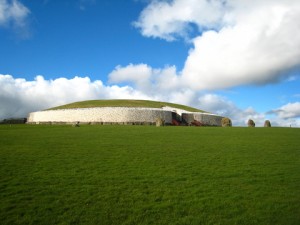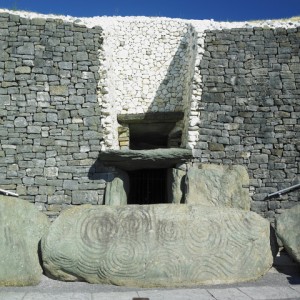Guest Post by: Bridget Staroscik O’Reilly
As I walked through the rain to the bus stop, after a quick check-in at the Brú na Bóinne Visitor Centre, I found myself wondering if the sight at the end of this trek was going to be worth it. As I hiked across the wooden bridge and down the path, water seeping into my shoes, I was tempted to turn back. This feeling deepened when I reached the bus stop and found I was the only person there.
 This visit to Newgrange was an anomaly on my mostly unplanned trip around Ireland. Everyone I talked to had raved about Newgrange, so I had made special plans to visit the sight. Still, as I stood there in the rain waiting for the bus that would (hopefully) take me to the actual tomb, I wondered if like so many ‘must sees’ Newgrange would be a disappointment.
This visit to Newgrange was an anomaly on my mostly unplanned trip around Ireland. Everyone I talked to had raved about Newgrange, so I had made special plans to visit the sight. Still, as I stood there in the rain waiting for the bus that would (hopefully) take me to the actual tomb, I wondered if like so many ‘must sees’ Newgrange would be a disappointment.
There is something magical about Ireland that makes you feel as though its years of history connect seamlessly to its present. I had seen a lot of that history as I followed rambling country roads through small towns. I had walked by stone walls that themselves dated back hundreds of years. The stones used to build the wall may well have come from ancient ruins that went back even farther.
That may sound farfetched, but a building project is how Newgrange was rediscovered in 1699. Charles Campbell had instructed his laborers to dig into what appeared to be a large mound of earth. He was hoping that they would unearth stones he could us for building materials. Instead, their digging they uncovered the entrance to the main passage tomb at Newgrange.
Newgrange was originally built around 3200BC and at some point the tomb was sealed and the location forgotten. Like many of Ireland’s historical sites, Newgrange was not closed up and carefully monitored until more recent times. This ease of access led to one of the more interesting aspects of Newgrange; the graffiti.
I find myself fascinated by what one Newgrange website referred to as an act of "evilly-disposed visitors”. It's hard to believe that people would actually write the 17th century equivalent of Kilroy Was Here on the stones of an ancient temple, but they did. We think of this as a modern problem, but the dates by some of the names and comments on the walls of Newgrange show that people in the 1700’s and 1800’s apparently felt a similar need to make themselves known.
 Still, perhaps the most intriguing fact about Newgrange is one that would have first become apparent to archeologists on the Winter Solstice. On that day each year, the sun’s light shines in through a hole above the entrance and lights up the interior for about 17 minutes. Obviously this makes the Winter Solstice a very popular day, so the 100 spots are given out by lottery.
Still, perhaps the most intriguing fact about Newgrange is one that would have first become apparent to archeologists on the Winter Solstice. On that day each year, the sun’s light shines in through a hole above the entrance and lights up the interior for about 17 minutes. Obviously this makes the Winter Solstice a very popular day, so the 100 spots are given out by lottery.
Don’t feel bad if you can’t make it to Newgrange that day. Towards the end of each tour, the entrance is closed and a light shined in to give visitors an approximation of what the tomb is like on Winter Solstice. As I stood there in the dark and watched the light that mimicked the sunrise slowly seeping in, I smelled the years-old earth and felt a sense of peace and wonder. I also thought to myself that yes, it was totally worth it.
Other articles by
Guest Post by: Bridget Staroscik O’Reilly
Beachcomber Pete Travel Adventures has more information on Newgrange as well as other places throughout Ireland
Have you traveled to Newgrange? Visited other parts of Ireland? Do you have any advice or recommendations for our readers?
Share your feedback in the comment section below







